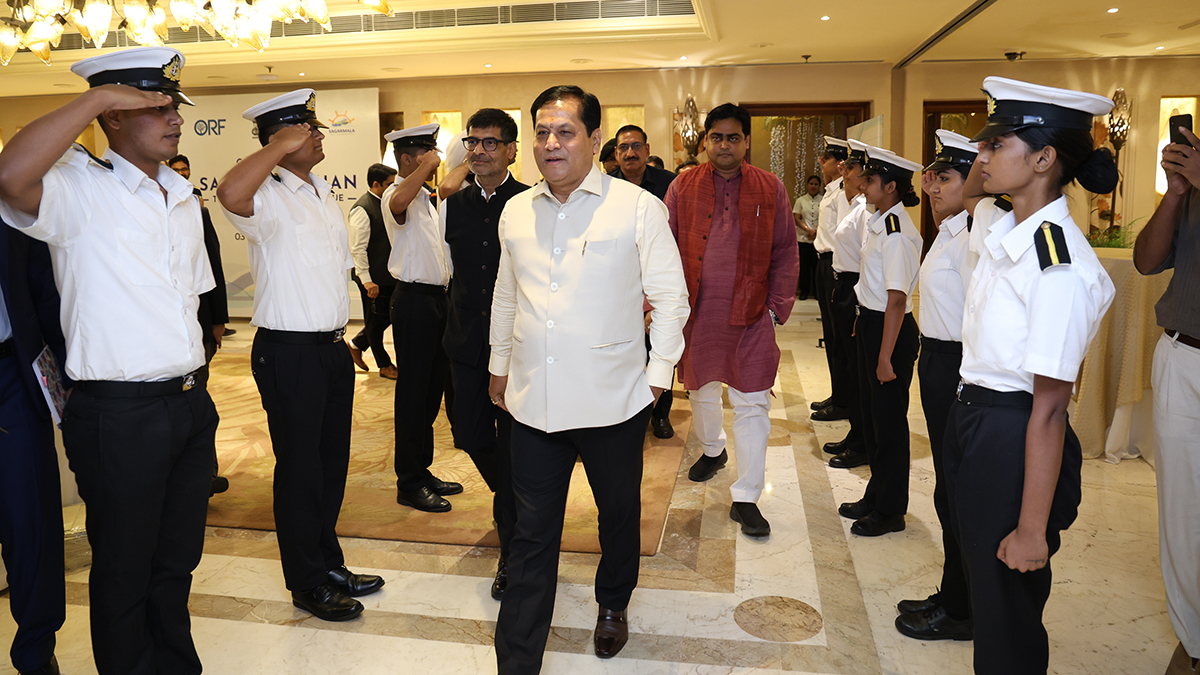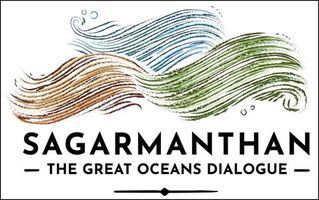THE NAME COULDN’T have been more apt. In Hindu mythology’s ‘Samudra Manthan’ (churning of the ocean), Mount Mandara was used as the churning stick and Vasuki, the thousand-headed snake, as the rope to extract ‘amrit’ (nectar) from the netherworlds. The gods who consumed the elixir became immortal, and therefore invincible.
In an ambitious, strategic move, the ministry of ports, shipping, and waterways (MoPSW) will be hosting ‘Sagarmanthan: The Great Oceans Dialogue’ in Mumbai on November 18 and 19. About 100 countries, including those from North America, South America, Europe, Eurasia, the Gulf, East Asia, South and Southeast Asia, Africa and the Quad are expected to participate. While announcing the mega event in Delhi on September 3, Union Minister Sarbananda Sonowal said that the dialogue aims to churn ideas, strategies and solutions that will lead to a more sustainable and equitable future for the greater common good.
The dialogue’s focus will be to set India’s and the global south’s interests in the maritime agenda, which thus far had been governed by the global north; the global south’s voice had remained a faint echo, at best. It is part of a plan to claim India’s rightful place on the high table of global deliberations on policies, developmental effort and geopolitical strategy. The dialogue will be a veritable platform for critical conversations around blue economy, maritime logistics, ports, shipping and waterways, critical minerals, diversified supply chains, global maritime economy and training and labour standards. There will be stakeholders from across fields, including leaders, policymakers, strategic thinkers, intergovernmental organisations, maritime policy research institutions and industry.
“There can be no doubt that we need to infuse new dynamism to reinvent India’s maritime prowess, more so when blessed with a long coastline and island chains on both sides of peninsular India,” Commodore R.S. Vasan (retd), regional director of the National Maritime Foundation, Tamil Nadu, told THE WEEK.
Today, 95 per cent of India’s global trade by volume and 70 per cent by value are carried out on the oceans, and India is the third largest in terms of ship recycling by tonnage. Despite being strategically located on the world’s shipping routes and with more than 7,500km of coastline, India is only the 16th largest maritime country in the world.
“For some unexplained reasons, to some extent attributed to ocean blindness, the shipping and port sector remained largely neglected,” said Vasan. “We have not progressed beyond the 12 major ports that were barely adequate to meet the demands of a growing economy. The fact that even today we are dependent on Colombo and Singapore for transshipment of merchandise is entirely due to non-development of suitable deep water modern ports. The glorious past, unfortunately, was left behind only to be eulogised.”
This has made the government sit up and act. “Whether it is connecting the Indian Ocean with the Mediterranean through the India-Middle East-Europe-Economic Corridor or opening immense trade and economic opportunities for the land-locked countries of Central Asia by building the International North-South Transport Corridor, the goal is clear―‘sabka saath, sabka vikas’,” said Sonowal.
A ministry official added that it is imperative for India, as it moves from the fifth-largest to the third-largest economy, to establish a more prominent presence in the global maritime governance matrix. “The realisation of our economic goals depends significantly on the strength of our maritime sector,” said Sonowal. “This includes our ability to shape global narratives, maintain resilient global supply chains and secure important maritime partnerships.”
And already the churn has set in. During the Global Maritime India Summit held in Mumbai last October, 360 MoUs totalling Rs10 lakh crore were signed with foreign and domestic stakeholders on government-to-government and business-to-business modes.
The MoUs include port development, modernisation, cruise sector, business and commerce, shipbuilding and knowledge sharing.
One such iconic project has been the development of the greenfield mega container port at Vadhavan on India’s west coast. The Vadhvan port development will create around one lakh jobs during construction and more than 12 lakh jobs once operational. In the 2023 Container Port Performance Index by the World Bank, nine Indian ports find a place among the top 100, with Visakhapatnam port in the top 20.
“The progress is indeed notable and there are visible signs of momentum in the ecosystem,” said Vasan, who is also director-general of Chennai Centre for China Studies. “The investment in spokes and hubs as part of rail, road, sea and river projects were long overdue and the planned projects would complement the aspirations of a maritime power. The inland waterways have taken rapid strides in the last decade or so and there are visible results along the Brahmaputra and Ganga. The operationalisation of Vizhinjam and modernisation of ports on both coasts have paid rich dividends and opened up new vistas. The plans for Galathia port in Nicobar would serve the needs of both the mercantile marine and the Indian Navy in the coming decades.”
About 15 per cent of global seafarers are from India, while the same cannot be said of India’s merchant fleet that accounts for just about two per cent of global tonnage. This is a serious setback as even today major tonnage is transported in Chinese hulls. In this context, the maritime vision document released by the government sets the right targets for concerned stakeholders.
Said Vasan: “India has its task cut out to overcome the hesitations of history to regain past glory of the Cholas, Kalingas and other kingdoms of yore, who harnessed the seas for wielding influence beyond the shores.”



